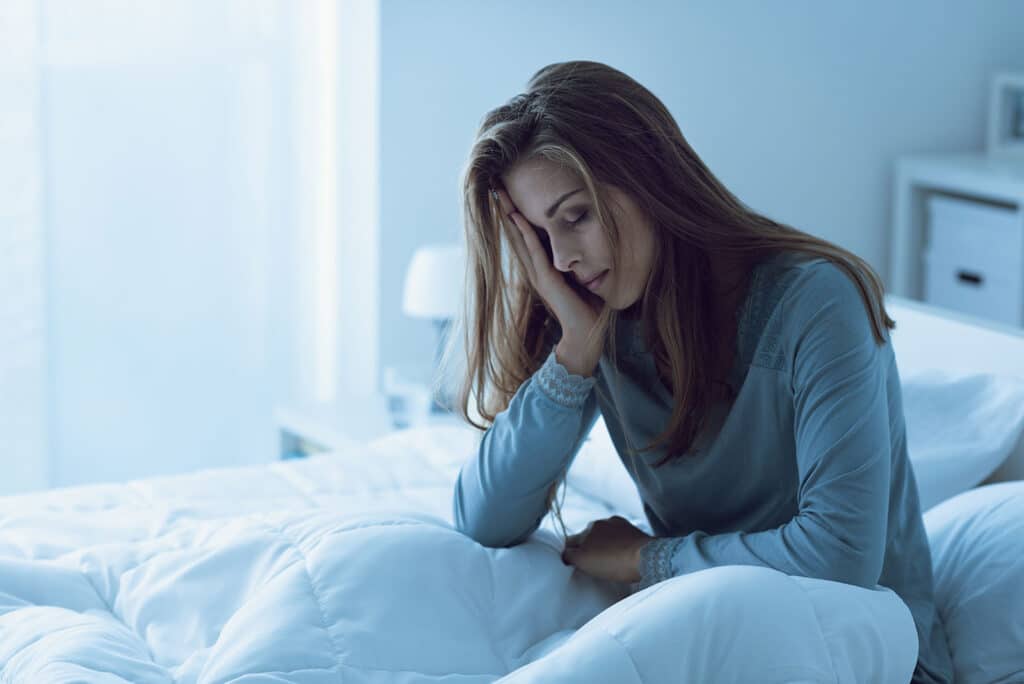Benzodiazepines are among the most commonly used — and misused — prescription drugs in the United States. Often simply referred to as “benzos,” they can offer relief from anxiety, insomnia and a variety of other conditions. Unfortunately, despite their widespread popularity, many people are unaware that benzos also have a darker side. Heavy or prolonged use may lead to dependence and addiction, resulting in a set of withdrawal symptoms known as “benzo flu.”
If you or someone you know is using benzodiazepines, understanding what benzo flu is, why it occurs and how it can be treated can help you manage or even prevent this unpleasant and uncomfortable condition.
Table of Contents
What Is Benzo Flu?
Benzo flu is an informal term that’s frequently used to describe the most common physical effects of benzodiazepine withdrawal. When someone dependent on benzos like Valium, Xanax, Ativan or Klonopin suddenly stops taking them, they may initially experience nausea, sweating, chills, body aches and other flu-like symptoms. Unlike the common flu, however, benzo flu is frequently accompanied by adverse psychological effects as well. Together, these physical and mental symptoms are known as benzodiazepine withdrawal syndrome (BWS).
Causes of Benzo Flu
Benzodiazepines primarily work by enhancing the activity of gamma-aminobutyric acid (GABA) receptors in the brain and nervous system. This produces the intoxicating hypnotic and anxiolytic effects that make benzos an effective treatment option for insomnia and anxiety disorders. Unfortunately, it can come at a steep cost.
With repeated use, your body quickly begins adapting to the effects of the drug, altering the natural balance of receptors and neurotransmitters. This can lead to physical dependence in as little as one to two weeks, causing you to experience withdrawal symptoms upon stopping or taking lower doses. Risk factors that may increase the likelihood and severity of benzo flu include higher doses, abrupt cessation and chronic, long-term use.

Symptoms of Benzo Flu
Depending on your usage, history, sensitivity and underlying physical and mental health, benzodiazepine withdrawal can manifest in many different ways. The influenza-like illness that characterizes benzo flu typically begins within hours of the last dose and can last from a few days to several weeks. It encompasses a wide range of physical ailments that may come and go over time. These include:
- Headaches
- Fatigue
- Sweating and chills
- Diarrhea and constipation
- Nausea and stomach cramps
- Muscle pain and stiffness
- Spasms and tremors
- Heart palpitations
As physically challenging as benzo flu can be, it’s often the mental aspects of withdrawal that are most distressing. Since many people take benzodiazepines to help manage anxiety disorders, it’s no surprise that ceasing use can produce a sudden rebound in these symptoms. In fact, benzo withdrawal can cause a variety of psychological issues, including:
- Anxiety and panic attacks
- Depression and malaise
- Disturbed sleep
- Anger and irritability
- Inability to concentrate
In rare cases, severe benzodiazepine withdrawal can even become dangerous. Without proper treatment and support, particularly heavy users may be at risk of experiencing psychosis, hallucinations, suicidal ideation and potentially life-threatening seizures.
Diagnosing Benzo Flu
With so much at stake, accurately identifying and managing benzo flu is extremely important. Because the early stages of withdrawal can be easily dismissed as a flu infection, healthcare providers need to carefully review your medical history as well as your symptoms. This requires a clear understanding of the medications and dosages in question, so it’s essential to be honest and forthcoming when seeking care.
Benzo Flu Strategies and Treatments
The prospect of going through withdrawal can be very stressful, making it difficult for some people to stop using benzos. With the right strategies and support, however, you can successfully manage the symptoms of benzo flu and begin taking the necessary steps toward a full recovery.
The most effective tool for overcoming benzo dependence is tapering, which involves gradually lowering your dose until it’s safe to discontinue the medication altogether. Since tapering too quickly can trigger withdrawal symptoms, this should always be done under the guidance of a medical professional. Your healthcare provider can help you create a personalized tapering schedule, regularly monitor your progress and make changes or prescribe other medications as needed to minimize discomfort.
If you need more specialized assistance, a detoxification program may be a more suitable option. Inpatient detox programs offer around-the-clock medical supervision, medication-assisted treatment, full psychiatric assessments and other therapies in a controlled, recovery-focused environment. Another vital key to success is establishing a strong support system. Depending on your needs, this may include counseling, therapy, education, support groups and other strategies aimed at building healthy coping skills, reducing stress and providing accountability.
Preventing Benzodiazepine Withdrawal
While benzos offer undeniable therapeutic value, they need to be used carefully to minimize the risks associated with withdrawal. That means using them only when necessary and always taking them exactly as directed. Whenever possible, it’s best to avoid using benzos for more than two weeks at a time. However, never stop taking your medication or change your dose without first consulting with your healthcare provider. In addition, consider asking your doctor if there are other drugs or alternative treatments available. These may range from SSRI and SNRI medications to therapy and lifestyle changes.
The Costs and Consequences of Benzo Flu
Though understandably overshadowed by the opioid crisis, benzodiazepine withdrawal is a serious public health threat in its own right. Many people are simply unaware of the dangers and become physically dependent through no fault of their own, losing their quality of life and experiencing profound mental health challenges. Sadly, little research has been done to shed light on the wider consequences of benzo flu, but there’s little doubt that it exacts a heavy toll on individuals and society alike.
It doesn’t have to be this way. Through better education, research and support, we can find lasting solutions to help promote recovery and mitigate the impacts of benzo flu. Call or contact the specialists at Allure Detox to learn more and get the help you need today.


